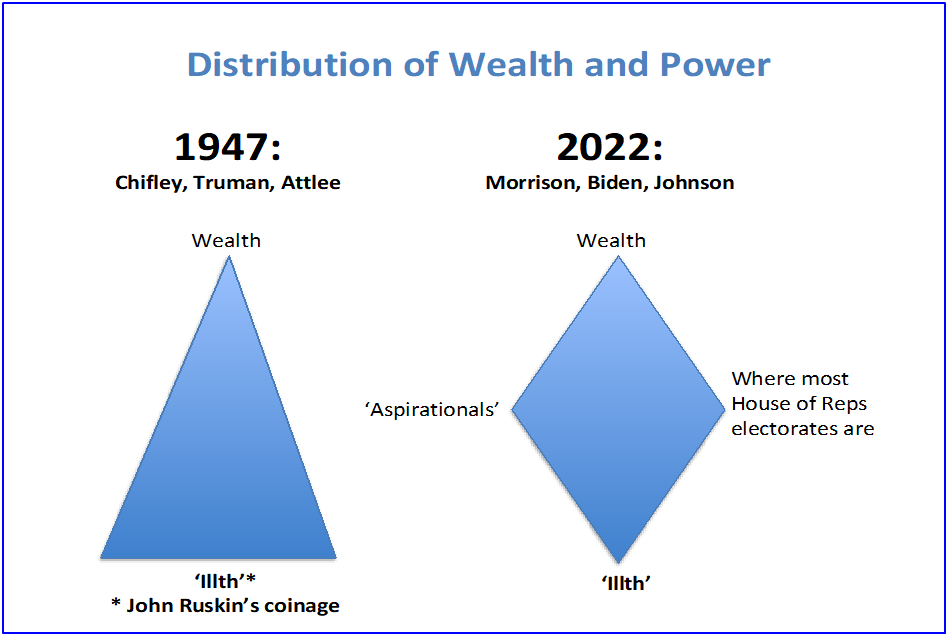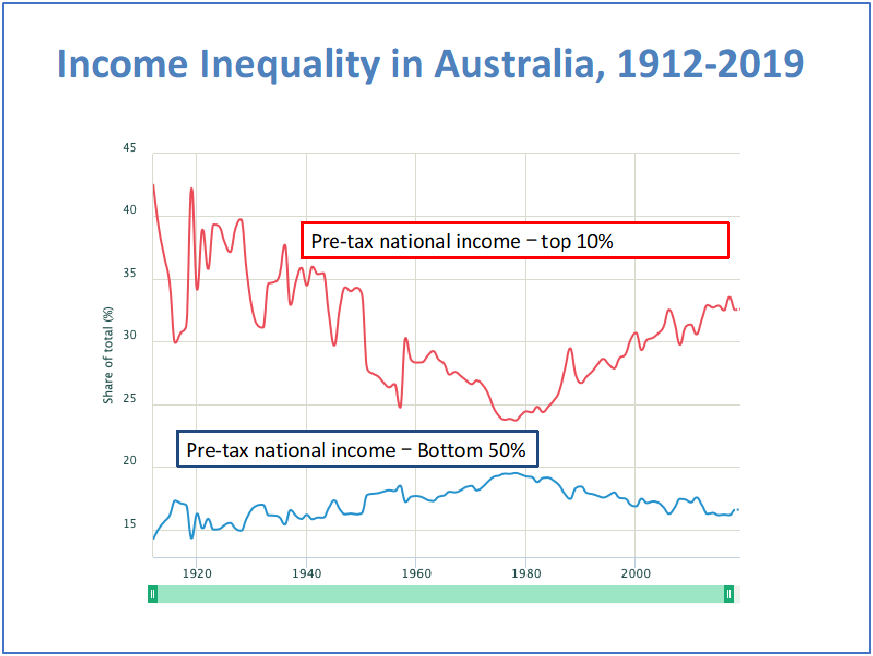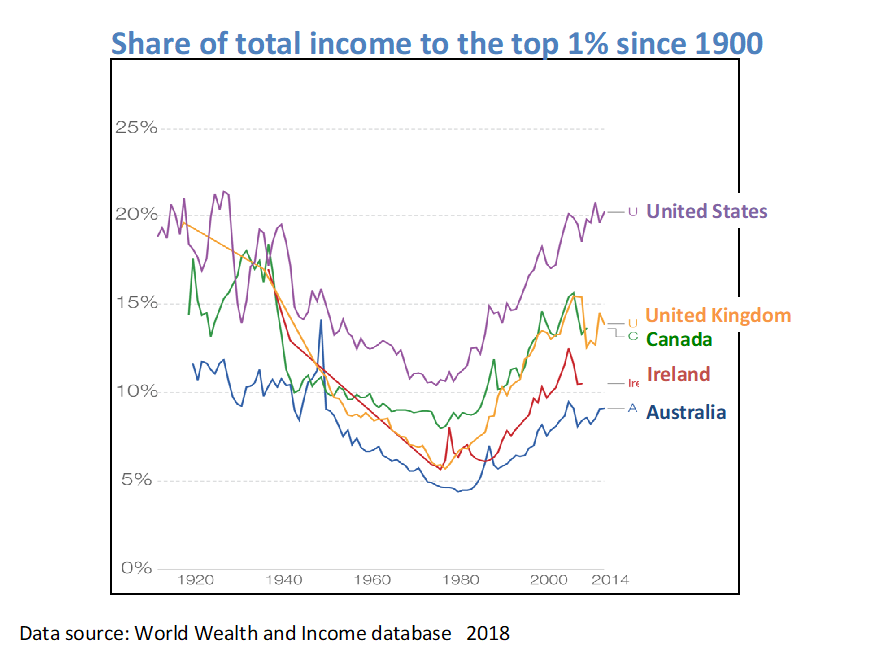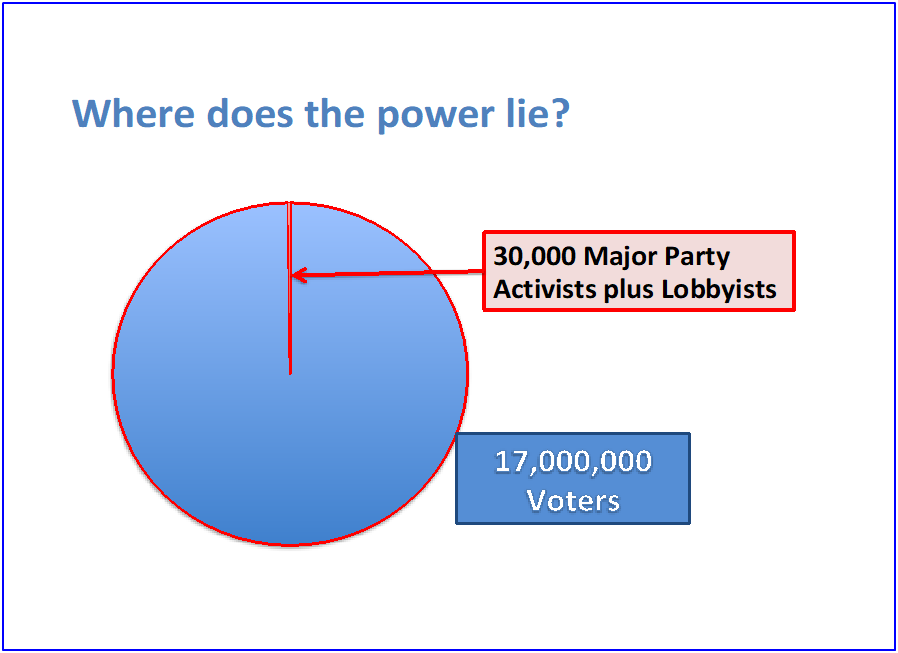JIM CARLTON INTEGRITY LECTURE 2022
Accountability Round Table (ART) – Melbourne Law School (MLS)
The Hon Barry Jones presented the Annual ART and Melbourne University Law School Jim Carlton Lecture at Melbourne Law School on Friday 29 April 2022
‘Liberty, Fraternity and – what was the other word?’ How equality fell off the political agenda in Australia.
The text of the Jim Carlton Integrity Lecture for 2022.
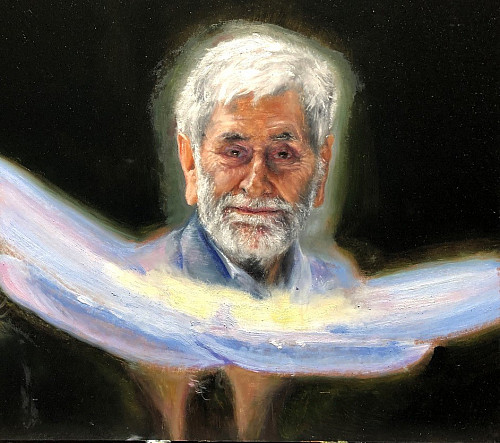 Barry Jones
Barry Jones
Abstract: ‘Equality’ dropped off Australia’s political agenda in the 21st Century. Both sides of politics recognise that winning elections depends on winning votes from ‘aspirationals’. So progressive taxation was dropped, education is more stratified in Australia than the UK or US, and governments/ political parties abandon ‘needs based’ policies.
A standard measure of ‘equality’ has been equal treatment under the law, but past decades have been marked by the protection of special interests who are above the law and the harsh treatment of those below the law. Big miners, private schools, and – for decades – casino owners were in the first category, government schools, asylum seekers, Indigenous Australians and people in insecure work in the second. Both sides of politics are tainted in this area.
In the age of retail politics, all values have a dollar equivalent, debate is minimal and ‘truth’ purely operational. Courage, imagination, curiosity, compassion have disappeared without trace.
What is to be done?
Acknowledgement of Country
I acknowledge the traditional ownership and continued custodianship of the Wurundjeri people of the Kulin nation on whose lands we meet and pay my respects to elders, past, present and emerging.
Jim Carlton
I was deeply touched when Di Carlton suggested to colleagues on the ART that I should deliver the Jim Carlton Integrity Lecture for 2022. I accepted with alacrity in case they had second thoughts. It is especially rewarding to have Di Carlton and her daughters Freia and Alex with us tonight.
Jim was born in Sydney in 1935, studied at the University of Sydney, became a management consultant and a Liberal Party official.
We were elected to the House of Representatives on the same day 10 December 1977 – Jim for Mackellar – succeeding William Charles Wentworth IV, me for Lalor, succeeding Jim Cairns.
We established a warm collegiate relationship, across party lines.
Recently I asked Di, ‘Do you remember when we met by accident at the Tate Gallery at a Degas exhibition?’ She replied, without a pause, ‘Yes, in January 1984.’
Jim was Minister for Health under Malcolm Fraser 1982-83 and Shadow Treasurer 1985-87.
He retired from Parliament in 1994 and was succeeded in Mackellar by Bronwyn Bishop. I stayed on until 1998, when Julia Gillard became Member for Lalor.
From 1994 to 2001 Jim Carlton was Secretary General of the Australian Red Cross, and received the Red Cross Movement’s highest international honour, the Henry Dunant Medal in 2007.
He was deeply involved with sustainable development in Papua-New Guinea and became a professorial fellow at the University of Melbourne.
An early, and influential, board member of the Accountability Round Table, he remained there until his sudden death at Christmas 2015, at the age of 80.
Jim Carlton was committed to integrity, truthfulness and open government, all currently under threat. He is sadly missed.
Declaration of interest: Vehicle or Destination?
I should clarify my position. I joined the ALP in 1950, had a total of 26 years in the Victorian and Commonwealth Parliament, was Minister for seven years and National President of the Party for eight. So I have reasons to be grateful to the Party.
But both major parties are showing their age, have become increasingly inward looking, fixated on their internal, factional, problems and reluctant to take courageous positions on great issues.
As a Life Member, I can only leave the ALP by dying and I am not quite ready for that.
John Hewson, the former Liberal leader, and I have teamed up in three areas: as board members of the Accountability Round Table (ART), Patrons of Climate200 and Joint Patrons of The Truth and Integrity Project (TIP) which makes short films on policy issues for social media.
This raises the question – ‘What is more important? – the destination (e.g. saving the planet) or the vehicle (winning with the ALP, Coalition, Greens)?
Introduction
I apologise to French history purists that for the sake of a catchy English title, I changed the order of the three elements that epitomised the French Revolution – Liberté, égalité, fraternité.
Liberté and fraternité are still with us, politically and socially, but in transmuted forms in English – ‘Freedom’ now means ‘freedom from accountability’ and Fraternity means ‘tribalism’. But égalité –‘Equality’ – has disappeared without trace.
Freedom = Liberté
What is sometimes called ‘the Enlightenment project’ has come under sustained attack in the United States, much of Europe and Australia. Instead, there is a retreat from reason; rejection of facts and expertise; the rise of populism, snarling nationalism, tribalism, and conspiracy theories; a fundamentalist revival and hostility to science; a failure of ethical leadership; deepening corruption of democratic processes; profound neglect of the climate-change imperative; and the triumph of vested interests. All are existential threats to civilisation’s advancement and the welfare of humanity, here and elsewhere.
Freedom has been used as a rallying cry by dissenters who reject the concept that political, economic and social decisions ought be based on evidence, analysis and reasoned debate, and assert that private judgment, essentially based on feeling and opinion should have priority. Laws, regulations or court decisions based on evidence or expertise are rejected as elitist, repressive and denying personal liberty, the freedom to insist that 2+2 = 5.
It was an important element in the French Presidential election campaign – and is in Australia’s current contest.
It can include:
- Freedom to deny the reality and threat of climate change.
- Freedom to deny that that Covid exists and to reject vaccines, masks and social distancing, freedom to infect others, to promote fake remedies.
- Freedom to abuse people, face to face or through social media, on the basis of gender, sexuality, language, race, culture.
- Freedom to ignore the needs of others.
- Free speech does not distinguish between truth and falsehood: the central problem with social media as the prime vector of information/ disinformation.
- Freedom to lie, to make stuff up, not to be accountable.
In recent years the only way to get a straight answer to a question has been through a ICAC/IBAC, Royal Commission or the courts.
Parliament, newspapers, television, radio, social media? Forget it!
Fraternity = Fraternité = Tribalism
Richard Nixon pioneered the ‘culture wars’ in which identity issues could be more powerful in how people vote than economic factors. This was taken much further by Donald Trump, Boris Johnson and Scott Morrison.
In the digital age, far from exploring the universal and the long term, both mainstream and social media emphasise the personal, or the tribal, in the short term. Opinion is preferenced over evidence, and feeling over rationality, while science and free enquiry are rejected or discounted. Empathy, the common good, and preserving the planet have low priority.
In the US, the UK, Australia, France, Germany and other European countries, there has been a striking shift in political allegiances, centred on the ‘culture wars’. The cleavage is not on economic issues, but on race, gender, religion, and attitudes to modernity and globalism. People in the higher socioeconomic levels are becoming more progressive, willing to embrace change and take risks; those in the lower levels are increasingly conservative, anxious about change, and risk-averse, seeing themselves as potential victims. (The French economist Thomas Piketty has written powerfully on this issue).
The ‘culture wars’ and attacks on ‘political correctness’, ‘cancel culture’ and ‘woke’ issues have transformed politics in the United States, Britain, Australia and France, promoting a tribal sense of unity based on common identity/language/ culture/ history/ nostalgia for a golden past and hostility towards, or fear of, ‘the Other’.
Fear and anger has been expertly manipulated and harvested – and this includes fear of radical change, of the unfamiliar, innovation, the complex and the abstract.
The Nixon strategy had several components:
- Appeal to the ‘the silent majority’, drawing support from citizens who were politically disengaged, and who had never spoken out or protested in any way about issues such as race, women’s rights, war, the death penalty or the environment. In effect, activism was characterised as bad-mannered, divisive, even unpatriotic, while silence was applauded.
- Finding issues such as abortion, state aid for church schools, same-sex marriage, the ability to hire and fire on religious grounds, which would activate many Catholics and most members of Protestant evangelical churches.
- Promoting hostility to experts, characterised as ‘elitists’, remote from the lives of ordinary citizens, so that important findings on climate change, health and diet and international comparisons on longevity, education levels and consumption patterns could be attacked or dismissed.
- Reviving the concept of ‘political correctness’. Ironically, this was originally a Stalinist coinage by the Communist Party to enforce the party line. It has been adopted by the Right, asserting that attempts to control language, driven by ‘elites’, imposes limitations on speech, belief or thought, for example by censuring exclusionary or derogatory language against minorities.
In 2019 condescension had been a factor in the ALP losing ground in Queensland when wise men (and some women) from the South proffered unwelcome advice.
The current Australian flag, the national anthem (‘Advance Australia Fair’, or should the last word be ‘White’?), retaining the monarchy and, earlier, the White Australia Policy, terra nullius and ‘the great Australian silence’ all express very long term settler values and the conviction that Australia’s history began, quite abruptly, on 26th January 1788.
Isaac Newton published his Laws of Motion in The Principia in 1687.
The third law, ‘Every action has an equal and opposite reaction’, seems curiously applicable, not only to physics, but also to history and the social sciences.
Everything is in motion. The tide retreats, then comes surging back.
Breaking down misogyny, hierarchy, racism and fundamentalism, ending censorship, freeing up religious debate and promoting multi-culturalism often provokes a hostile reaction: revival of white supremacy, justification of hate speech and trolling as essential elements of freedom, demonising sexual minorities, sharp attacks on expertise, denouncing evidence or reasoned argument as ‘fake news.’
Sport is the most familiar form of institutionalised tribalism, with identification and loyalties that transcends class (and is also very big business.) Almost two million Australians are members of football or cricket clubs – 58% of them in the AFL – about 65 times greater than the number of people actively involved in political parties.
Election campaigns are characterised not by high level debate but by coded language, essentially pre-literate – ‘memes’ = a look, smirk, clothing, gesture (unspoken), location – throwing a ball, a spot of welding, hair washing (not feet washing, at least, not yet).
Equality
In, say, 1947 the distribution of population and relative affluence in Australia, the US and the UK could have been represented by a triangle/ pyramid, with the great majority of people near the base.
In the UK, Clement Attlee was providing decent housing, decent health care, decent education, decent pensions, using progressive taxation and other social measures to take people out of destitution, overcoming a pervasive passivity and fatalism about what could be achieved. Seventy five years later, Margaret Thatcher notwithstanding, Attlee’s aims (Chifley’s and Harry Truman’s in the US, too) had largely been fulfilled.
You will note the unfamiliar word ‘illth’, which, I think, is worth reviving. It’s a 19th century coinage by the English author, art critic and social reformer John Ruskin, defining the underside of ‘wealth’: the collateral damage caused by change and accumulation of power.
‘Equality’ dropped off Australia’s political agenda in the 21st Century. Both sides of politics recognise that winning elections depends on winning votes from ‘aspirationals’ who live in electorates with relatively high average incomes and who identify with the SES rankings above them. So progressive taxation was dropped, education is far more stratified in Australia than the UK or US, and governments/ political parties abandon ‘needs based’ policies.
A standard measure of ‘equality’ has been equal treatment under the law, but past decades have been marked by the protection of special interests who are above the law and the harsh treatment of those below the law. Big miners, private schools, and – for decades – casino owners were in the first category, government schools, asylum seekers, Indigenous Australians and people in insecure work in the second. Both sides of politics are tainted in this area.
In the age of retail politics, all values have a dollar equivalent, debate is minimal and ‘truth’ purely operational. Courage, imagination, curiosity, compassion have disappeared without trace.
Inequality within countries is growing.
Inequality between countries is reducing.
Where people live defines their prospects.
Extreme inequality is rising, benefitting the richest.
(1 per cent of the world’s population owns 48 per cent of global wealth. Elon Musk, CEO of Tesla, has a total wealth greater than 50 poor nations).
In Australia there are entrenched inequalities in
- income
- wealth
- health/life expectancy
- education
- gender
- sexuality
- access to water, electricity, sewerage, libraries, sporting facilities
True, Australia is far from the worst case (South Africa, as it happens) but inequality is increasing and we don’t talk about it.
Life expectancies in Federal electoral divisions vary significantly (although, to be fair, the Australian age profile is far better than in the United States): more than 86 years in Bradfield (northern Sydney), 76 years in Lingiari (Northern Territory).
All of the longest-living electorates were in capital cities, and all but two were in Sydney or Melbourne—peaking at over 86 years on Sydney’s North Shore. The lowest 20 divisions were spread across most states and were all regional apart from a handful of outer-urban divisions.
In 2021, Australia had 4,030,717 pupils in schools. Just 65.1 per cent were enrolled in government schools, 19.5 per cent in the Catholic system, and 15.4 per cent in Independent schools.
In the United Kingdom, which might have been seen as the model for our educational practice, government schools cater for 93.5 per cent of the students. In Canada and New Zealand, the percentages are even higher. In the United States, the figure is 87 per cent.
Even where parents have attended Government schools themselves, once they choose to send their children to private schools they generally cease to be effective advocates for the State system. Often they say: ‘I believe in the State system, but Toby and Miranda have special needs, so we send them to private schools’. Toby and Miranda have already left. Will Jason and Kylie follow? If the State system broke down, the impact on social cohesion would be serious.
The strength of a large, comprehensive State system is that it permits/encourages diversity inside school and social cohesion outside it, rather than cohesion inside school and diversity (often harsh or fragmented) outside it.
No issue is more politically highly charged (even climate change) than public funding for private schools – Australia’s experiment in transferring taxation benefits upwards: middle class welfare. This funding creates and reinforces a powerful vested interest, and is highly significant in bonding political support.
Of 500 indigenous deaths in custody since the 1991 Royal Commission, the number of convictions for police/ warders accused of culpability has been – zero. Indigenous issues are unlikely to be mentioned in political campaigning in 2022.
Toxic politics and lack of ambition: Australia’s 2022 election
Almost all elections turn on three factors: leadership (a highly personal judgment (‘I don’t trust X’), ideological or ‘It’s time (‘give the others a go.’)
The 2022 Australian Federal election has a disconcerting resemblance to the US Presidential contest in 2020, with Scott Morrison playing the role of Trump lite, but smirking, not snarling, with Albanese paralleling the immensely experienced but uneasy Biden, then aged 78.
Trump filled the screen – Biden did not. Nevertheless, Biden won.
Australia has 17,000,000 enrolled to vote but in my estimate barely 30,000 living, breathing persons, not on life support systems, could be regarded as active members of mainstream political parties – about 0.2% of voters.
It is just possible that Clive Palmer’s claim of having 80,000 members in his United Australia Party is correct, although how many are paid up is a different question. This would make its membership more than double the number of activists in the mainstream parties combined. But it may reflect the degree of alienation and anger in segments of society, a reaction to Covid lockdowns, anger about multi-culturalism, refugees and the breakdown of patriarchy, fuelled by conspiracy theories.
In 2019 the ‘alt-right’ gained 1,300,000 votes, 9.1 % nationally, 16.7 % in Queensland. Scott Morrison is not part of the ‘alt-right’ but he needs their preferences in a tight election, so he needs to send out coded messages to them without further alienating the moderate Liberal base.
Our election campaigns are marked by personal attacks, stunts, scare campaigns, photo ops and ‘gotcha’ moments. There is no serious debate on major issues. France had a debate between Macron and Le Pen which ran for three hours. A comparable debate in Australia is unthinkable: heroic viewers would be catatonic long before the end.
Australia took a leading role in the establishment of the United Nations, the UN Conventions on Genocide, the Universal Declaration of Human Rights, preserving Antarctica from mineral exploitation. It seems inconceivable now that Australia could take the lead on any major international policy, so shrivelled is our ambition.
Australia could exercise a far greater international influence if it chose to.
Russia, a major power, with a population of 145 million, ranks No. 11 in world rankings for Gross Domestic Product. Australia, with 26 million, ranks No.13. (Canada with 38 million ranks No.8)
If we worked closely with the US, Japan, UK, Germany, France, Canada and New Zealand on climate change issues we could, collectively, make a very powerful contribution. (At present we are ranked with Brazil).
In adopting a ‘small target’ strategy, which has never been a dazzling success in the past, Labor has willingly accepted Morrison’s terms of engagement, fearful of being wedged by his brutal campaigning and spooked by memories of the unlosable election of 2019.
Nevertheless, in five areas Labor is superior to the Coalition:
- Commitment to a Commonwealth Integrity Commission with strong powers to investigate political corruption, hold public hearings and demand straight answers, on oath
- It is serious about the extraordinary power imbalance based on gender and reforming the toxic culture of Parliament House, Canberra
- Person for person, Labor’s front benchers are more capable than their Coalition counterparts – Wong, Plibersek, Shorten, Dreyfus, Husic, Chalmers, Keneally, Burke, Butler, Bowen, O’Connor, Gallagher, Marles. Anthony Albanese is very collegiate, was an excellent Minister, negotiator and Leader of Government business, and completely straight.
- Labor would be less secretive, corrupt or vindictive and preserve our great public institutions.
- More effective use of the Commonwealth Public Service.
Labor has quite a sensible energy policy (‘Powering Australia’) but is oddly coy about the science of climate change which is its rationale. Neither the ALP or Coalition will utter the ‘c’ word: coal, or the ‘p’ word: planet. Both are remorselessly short term in their advocacy.
Homo sapiens has morphed into Homo economicus, because all our politics revolves around production and consumption.
Despite the magnitude of Australia’s problems, I am confident that there are solutions.
There are ten priorities for our time if we are to survive the next half century without irreversible damage to the biosphere and our social and political institutions.
- Strong action on climate change, transition to a post-carbon economy, recognition that coal is the biggest single source of greenhouse gases, that the environment is not the enemy and that Australia can be a world leader in adopting economically complex industries (ECIs) with far higher added value than bulk commodities
- Challenge major parties to adopt open democratic practices, come clean on funding, expose the role of lobbyists and restore trust in public institutions. As major parties fail to respond, it is inevitable that angry and well-informed citizens create alternatives.
- Reject ‘the Nixon strategy’ of winning elections by promoting division, exclusion v. inclusion, cultivating ‘the base’, persuading economic victims to blame those below them – race, refugees, exploit the condescension factor and promote resentment of expert opinion. Winner takes all (‘the people have spoken’).
- Making a personal commitment to strengthening liberal democracy, recognising the threat posed by the rise of populist authoritarian leaders.
- Protecting the right to be informed as a central tenet of democracy: preserving the ABC and its investigative reporting, recognising the importance of a free media, not subject to commercial pressures or government bullying, strengthening the public service’s capacity to give ‘frank and fearless’ advice, and provide adequate funding for CSIRO, the Bureau of Meteorology and university research. Resist secrecy as the immediate fall-back position by government to avoid embarrassment.
- Recognising that inequality is not just a social Darwinian byproduct of the economic system (‘survival of the fittest’) but a political artefact: not an accident, but built into decisions about taxation, education and health. Thomas Piketty, the French economist, is right [1]
- Insisting that the goal of education must be to enable people to fulfill human potential for the whole of life, not just to train pupils to be consumers and producers for the contemporary economy. The syllabus should include some political science, philosophy, the humanities, the arts and exposure to comparative religion, with encouragement for speculative thought > imagination > creativity > aesthetics > historical perspective.
- Reject all forms of racism and adopt rational and humane responses to the refugee/ asylum seeker crisis. Give high priority to the Uluru ‘Statement from the Heart’ and take stronger action on the Closing the Gap strategy.
- Resist fundamentalism and rethink the nature of freedom and tolerance.
- Recognise the moral basis of progressive taxation and not retreat from it.
On taxation both major parties offer the equivalent of the Indian rope trick.
In an ageing, insecure context, with a likely contraction in exports to our principal trading partner (China), and huge but uncosted expenditure on nuclear submarines, which we cannot service, to protect us (against China), increased outlays for aged care, NDIS, hospitals, rail links, rebuilding infrastructure after natural disasters, repaying borrowed funds, both Labor and the Coalition insist that taxation levels will not rise: growth alone will meet all needs.
Really?
Contrary to what might have expected,
- electorates that swung from Labor to the Coalition in 2019 were marked by higher unemployment, lower incomes and (in some cases) fewer migrants, while
- electorates with an increased ALP vote were marked by higher education, extensive use of franking credits and negative gearing.
Labor gained significant swings in wealthy electorates such as Bennelong, Bradfield, Sydney, North Sydney in NSW, Goldstein, Gellibrand, Higgins, Macnamara, Menzies in Victoria, Ryan in Queensland, Curtin in Western Australia, but lost ground in Blaxland, Fowler, Lindsay, Aston, Calwell, Fraser, Gorton and Lalor.
The greatest problem of all – climate change – could be the easiest to tackle with higher levels of community engagement.
The number of Australians with lived experience of climate change from direct observation — farmers, gardeners, vignerons, birdwatchers, bushwalkers, firefighters, anglers, skiers, beekeepers, photographers, aviators – amounts to millions – but they are currently disengaged from, and repulsed by, the way politics operates
Their expertise should been harnessed by the hegemonic parties to ensure that powerful mitigation measures were adopted, but was not.
Politics always trumps the science. The National Party insists that reducing greenhouse gases, including methane, would be disastrous for farming, but the National Farmers Federation says, ‘We are already doing it.’ Major energy generators propose to phase out or close down coal fired power stations, but Angus Taylor says, ‘No, you can’t do it.’ Banks, superannuation funds and insurers are making lending or investment decisions based on climate change risks, but elements in government insist ‘No, you mustn’t.’ Oddly, State governments, both Coalition and ALP, have been far more courageous than the Commonwealth in setting climate change targets.
Instead of hand-wringing citizens must engage, engage, engage. As Ross Garnaut has argued we should not fear transition to a post-carbon economy – we have the potential to be a superpower in that area.
Voters are now spectators, not participants, in the political process.
Exploitation of citizen passivity is the secret weapon of the major parties.
Much could be achieved in a range of policy areas if even a small proportion of our citizens were prepared to engage.
If 1000 citizens in each of the 151 Federal electoral divisions could be persuaded to join the political party that they normally vote for, play an active, principled and informed role, insist on a reform platform, and fight existing factional systems/ cliques this would only involve 1.0 per cent of all voters.
But it would be a political revolution.
I conclude with W B Yeats (‘The Second Coming’):
What will be our legacy?
Posterity will be harsh on this generation if we fail to act.
[1] So is Dr Andrew Leigh, Federal MP for Fenner in the ACT who explores the Australian egalitarian ethos in his book Battlers & Billionaires.‘Australians typically prefer mate to sir, don’t stand up when the PM enters the room, and don’t have private areas on our beaches. Many of us sit in the front seat of a taxi, and there’s an ethic that dates back to gold rush days that Jack isn’t just as good as his master, but maybe better.’ That ethos is now under threat from the relentless rise in inequality, documented by Tony Atkinson and Andrew Leigh.
RELATED
Crikey published an edited version of this speech the day it was delivered, Apr 29, 2022.

